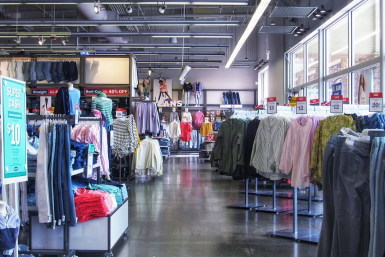第八课 - 副词
介绍
欢迎来到学英语课程的第8课。在本课中,你将学习如何使用英语中的副词。你还将学习一些常见的英语副词。课程中包含的Flash卡片可以帮助你学习本课中介绍的副词。
包括一个简短的英语对话,以帮助提高您对英语的理解。
谈话

English
Cathy needs a new shirt, so she and Sarah walk into a clothing store.
Sarah: This t-shirt is very nice.
Cathy: Yeah, but it's too small.
Sarah: How about this blouse?
Cathy: I don't like the colour.
Sarah: These shirts are on sale and they are very cheap.
Cathy: I like the blue shirt and the red shirt.
Sarah: I think I want to buy one of these shirts too.
Cathy: Which color do you like?
Sarah: I like the white shirt.
Cathy: Let's go buy them.
词汇和短语
 This t-shirt is very nice.
This t-shirt is very nice.
|
这件T恤非常好看。 |
 How about this blouse?
How about this blouse?
|
这件衬衫怎么样? |
 I don't like ___.
I don't like ___.
|
我不喜欢___。 |
 I think I want to buy one of these shirts too.
I think I want to buy one of these shirts too.
|
我想我也想买这些衬衫中的一件。 |
 Let's go buy them.
Let's go buy them.
|
我们去买吧。 |
 cheap
cheap
|
廉价 |
 shirt
shirt
|
衬衫 |
广告
Adverbs
 already
already
|
已经 |
 always
always
|
总是 |
 even
even
|
甚至 |
 happily
happily
|
高高兴兴 |
 here
here
|
这里 |
 immediately
immediately
|
立即 |
 never
never
|
决不 |
 now
now
|
现在 |
 often
often
|
经常 |
 quickly
quickly
|
很快 |
 sadly
sadly
|
可悲的是 |
 shortly
shortly
|
不久 |
 slowly
slowly
|
徐徐 |
 sometimes
sometimes
|
有时候 |
 so
so
|
非常, 这样 |
 soon
soon
|
不久 |
 suddenly
suddenly
|
突然 |
 there
there
|
那里 |
 too
too
|
太 |
 usually
usually
|
平常 |
 very
very
|
非常 |
语法
Adverbs
副词是修改或限定动词、形容词或其他副词的词。副词通常表达方式、地点、时间、频率、程度或确定性水平。它们通常用于回答诸如如何、在哪里、何时、多久以及到什么程度等问题。副词在他们修改的单词之前。
副词有时是通过在形容词末尾添加 ly 来从形容词构建的。
| Adjective | Adverb |
|---|---|
| soft | softly |
| slow | slowly |
| happy | happily |
下面是一些在句子中使用副词的例子。副词用黑体表示。
例子
 They always go to the store on Monday.
They always go to the store on Monday. |
他们总是去商店周一。 |
 I'm never late.
I'm never late. |
我从不迟到。 |
 She never drinks coffee.
She never drinks coffee. |
她从来不喝咖啡。 |
 Wait here.
Wait here. |
在这儿等着。 |
 We slowly walked up the hill.
We slowly walked up the hill. |
我们慢慢地走着上山。 |
 Suddenly, he was there.
Suddenly, he was there. |
突然,他在那里。 |
 I often drink tea in the afternoon.
I often drink tea in the afternoon. |
我经常在下午喝茶。 |
Sentence Templates
英语中一个非常常见的句子模板是:
subject + be very + adjective.
句子的主语可以是名词或代词。
例子
| The pizza is very good. | 比萨是非常好的。 |
| We are very hungry. | 我们非常饿。 |
| I am very happy. | 我很高兴。 |
| She is very smart. | 她很聪明。 |
| The TV is very expensive. | 电视机是非常昂贵的。 |
| The store is not very busy. | 这家商店是不很忙吧。 |
另一个英语常用的句子模板是:
subject + be too + adjective.
或问一个问题时:
be + subject + too + adjective?
例子
| The coffee is too cold. | 咖啡太冷。 |
| I am too tired. | 我太累了。 |
| The TV is too expensive. | 电视机是非常昂贵的。 |
| Is the TV too expensive? | 是电视太贵了? |
| The TV is not too expensive. | 电视是不是太昂贵。 |
这是一些使用动词 be,adjectives 和 adverbs 的更常见的句子模板。
- subject + be really + adjective.
- subject + be quite + adjective.
- subject + be so + adjective.
- be + subject + really so + adjective?
- subject + be pretty + adjective.
类似的模板可与动词 seem,feel 和 look 一起使用。
例子
| She is really happy. | 她是真的很开心。 |
| He is quite tall. | 他是相当高的。 |
| You are so nice! | 你人真好! |
| Is it really so hard? | 难道真的这么难吗? |
| The coffee is pretty strong. | 咖啡很坚固。 |
| The cookies are so good! | 饼干是那么好! |
| It was pretty easy. | 这是很容易。 |
| She seems really nice. | 她似乎真的很好。 |
| I feel so tired. | 我觉得这么累。 |
| The ice feels so cold. | 冰感觉如此寒冷。 |
| Does it really look so bad? | 它是否真的看起来那么糟糕吗? |
| They look pretty tired. | 他们看起来很累。 |
Adverbs of Frequency
在谈到例行公事和习惯时,经常使用频率副词。下表显示了这些从最频繁到最不频繁订购的副词。
| 100% | always |
| almost always | |
| usually | |
| often | |
| frequently | |
| sometimes | |
| occasionally | |
| seldom | |
| hardly ever | |
| rarely | |
| 0% | never |
Flashcards
以下是一些 flashcards,可帮助您学习本课程中包含的副词。
练习
按音频图标,然后写出您听到的英语单词或句子。按验证按钮,看看你的答案是正确的。

|
|

|
|

|
|

|
|

|
测验
参加在线考试,了解您对本课内容的理解程度。

